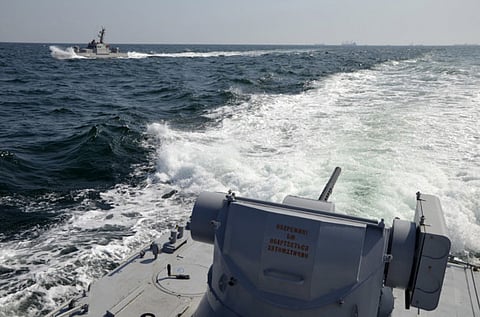On Ukraine, calmer heads must prevail
Simmering tensions between Kiev and Moscow have the potential to escalate quickly

Tensions between Ukraine and Russia are now severely strained that the slightest misstep may indeed have dire consequences and trigger military engagements. On Monday, the parliament in Kiev approved a presidential plan to impose martial law in regions of Ukraine neighbouring Russia to its east, and the move came a day after Russian naval forces captured three of its vessels and detained 23 crew members.
Ever since Moscow’s annexation of Crimea in March 2014, and the Kremlin’s support of a breakaway separatist movement centred on Donetsk in eastern Ukraine, violence in the region has claimed some 10,000 lives. A fragile peace brokered with the assistance of Germany and the European Union is largely holding, but the latest clashes at the narrow chokepoint entering the Sea of Azov in recent days has placed that peace under the microscope.
The danger of any military engagement in the region is that it will be hard to contain. What’s more, it has the potential to escalate, given that the North Atlantic Treaty Organisation will be under pressure to support the government in Kiev. But there is a reality too that Russian infractions in the region have been met with a timid response — Crimea’s annexation was achieved swiftly with only economic sanctions following — and the Russian leadership might feel emboldened by that lack of response from the west. While the incidents in the Sea of Azov have taken on greater significance, the imposition of martial law in Ukraine has led to Russian President Vladimir Putin expressing “serious concern” at the move, while Kiev has said the seizures of its vessels were “an act of aggression”. Clearly, as it stands right now, this crisis has every potential to escalate.
The United Nations Security Council has met to discuss the crisis, but the meeting broke up without any conclusion — highlighting the sharp divisions on the Ukraine-Russia tensions between East and West.
Ukraine itself is a nation that is divided between a Russian-speaking minority in its eastern regions, and a pro-European majority in its western portion. There are fears that the move to call martial law may be a ruse by Ukrainian President Poroshenko to try and delay a presidential poll set for the end of next March, a claim he denies, arguing the need for such a law is to counter a threat of Russian military action.
This is a time where the leaders of East and West must begin an earnest dialogue to resolve these simmering and combustible tensions, and the sooner that process begins, the better for everyone: In Ukraine and beyond.



